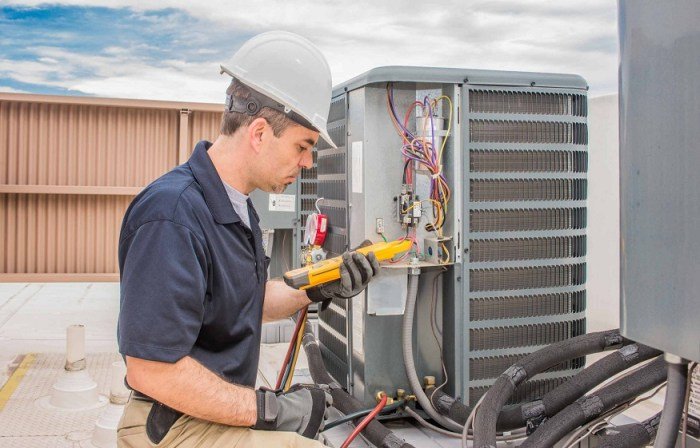In the realm of project management, the integration of HVAC software has emerged as a game-changer, transforming the way HVAC projects are planned, executed, and monitored. This specialized software empowers project managers with advanced tools and capabilities, enabling them to streamline workflows, optimize resource allocation, and enhance project outcomes.
HVAC software for project management offers a comprehensive suite of features tailored to the unique demands of HVAC projects. From design and engineering to installation and maintenance, these tools provide a centralized platform for managing every aspect of the project lifecycle.
HVAC Software for Project Management
HVAC software for project management is a specialized software application that helps HVAC contractors and project managers plan, execute, and track HVAC projects. It provides tools for project scheduling, cost estimation, resource allocation, and document management.
Using HVAC software for project management offers several benefits, including:
- Improved project planning and scheduling
- Accurate cost estimation and tracking
- Efficient resource allocation
- Centralized document management
- Enhanced collaboration and communication
Examples of HVAC Software for Project Management
- AutoCAD MEP
- Revit MEP
- Trimble MEP
- Bluebeam Revu
- Procore
Key Features of HVAC Software for Project Management

HVAC software for project management offers a range of features that can help project managers streamline their workflows and improve project outcomes. These features include:
- Project planning and scheduling: HVAC software can help project managers create and manage project plans, including tasks, timelines, and dependencies. This can help to ensure that projects are completed on time and within budget.
- Document management: HVAC software can help project managers store and manage project documents, such as drawings, specifications, and contracts. This can help to keep projects organized and ensure that everyone has access to the latest information.
- Communication and collaboration: HVAC software can help project managers communicate with team members and stakeholders. This can help to keep everyone informed about project progress and to resolve issues quickly.
- Cost tracking: HVAC software can help project managers track project costs, including labor, materials, and equipment. This can help to ensure that projects are completed within budget.
- Reporting: HVAC software can help project managers generate reports on project progress, costs, and other metrics. This can help to keep stakeholders informed and to identify areas for improvement.
HVAC software for project management can be used to manage a wide range of HVAC projects, including new construction, renovations, and maintenance. By using HVAC software, project managers can improve project efficiency, reduce costs, and improve communication and collaboration.
Example
A project manager is using HVAC software to manage a new construction project. The software helps the project manager to create a project plan, schedule tasks, and track costs. The software also allows the project manager to communicate with team members and stakeholders, and to generate reports on project progress.
Benefits of Using HVAC Software for Project Management
HVAC software for project management offers a wide range of benefits that can help businesses streamline their operations, improve efficiency, and reduce costs.
Some of the key benefits of using HVAC software for project management include:
- Improved communication and collaboration: HVAC software can help project managers and team members communicate more effectively and collaborate on projects. The software can be used to track project progress, share files, and discuss issues.
- Increased efficiency: HVAC software can help project managers automate many tasks, such as scheduling, budgeting, and tracking progress. This can free up project managers to focus on more strategic tasks.
- Reduced costs: HVAC software can help project managers reduce costs by identifying and eliminating waste. The software can also help project managers track project expenses and make informed decisions about how to allocate resources.
- Improved quality: HVAC software can help project managers improve the quality of their projects by providing them with the tools they need to track progress, identify risks, and make informed decisions.
There are many case studies and examples of how HVAC software has been used to improve project outcomes.
For example, one study found that a construction company was able to reduce project costs by 15% by using HVAC software to manage its projects.
Another study found that a manufacturing company was able to increase production by 10% by using HVAC software to manage its projects.
The benefits of using HVAC software for project management are clear. HVAC software can help businesses streamline their operations, improve efficiency, reduce costs, and improve quality.
Challenges of Using HVAC Software for Project Management
While HVAC software can offer numerous benefits, there are also some challenges associated with its implementation and use. These challenges include:
- Data Entry: Inputting large amounts of data into the software can be time-consuming and error-prone.
- Software Complexity: HVAC software can be complex and require extensive training to use effectively.
- Integration with Other Systems: Integrating HVAC software with other project management systems can be challenging.
- Cost: HVAC software can be expensive to purchase and maintain.
Overcoming the Challenges
To overcome these challenges, consider the following strategies:
- Use Data Import/Export Features: Utilize software features that allow for importing and exporting data to streamline data entry.
- Invest in Training: Provide comprehensive training to users to ensure they are proficient in using the software.
- Seek Integration Support: Consult with software vendors or IT professionals for assistance with integrating HVAC software with other systems.
- Consider Cloud-Based Options: Cloud-based HVAC software can reduce upfront costs and simplify maintenance.
Tips for Implementing HVAC Software
To ensure successful implementation of HVAC software, consider the following tips:
- Define Clear Objectives: Determine the specific goals and objectives for using HVAC software before implementation.
- Involve Stakeholders: Engage key stakeholders throughout the implementation process to gather input and ensure buy-in.
- Start with a Pilot Project: Implement the software on a smaller scale to identify and address any issues before full deployment.
- Provide Ongoing Support: Offer ongoing training and support to users to ensure they are using the software effectively.
Best Practices for Using HVAC Software for Project Management
Leveraging HVAC software effectively in project management requires adhering to best practices to maximize its benefits. By following these guidelines, project managers can optimize their use of the software and enhance project outcomes.
To ensure successful implementation, consider the following best practices:
Define Clear Objectives and Scope
Before utilizing HVAC software, it’s crucial to define the project’s objectives and scope. This includes determining the specific tasks that the software will be used for, such as design, simulation, or project tracking. Clearly outlining the intended use of the software will help ensure that it is effectively employed throughout the project lifecycle.
Establish a Standardized Process
To maintain consistency and efficiency, establish a standardized process for using HVAC software. This involves defining clear roles and responsibilities for team members, setting up templates and workflows, and implementing quality control measures. By establishing a structured process, project teams can avoid errors, reduce rework, and improve overall project performance.
Integrate with Other Software
HVAC software should be integrated with other project management tools to enhance collaboration and streamline workflows. By integrating with software for document management, scheduling, and communication, project managers can access all relevant information in one central location, facilitating efficient decision-making and real-time project updates.
Train Team Members Thoroughly
Effective use of HVAC software requires proper training for all team members involved in its operation. Training should cover both the technical aspects of the software and its application in the context of the project. By ensuring that team members are well-versed in the software’s capabilities, project managers can minimize errors and maximize the software’s benefits.
Regularly Monitor and Evaluate
To ensure that HVAC software is being used effectively, it’s essential to monitor its usage and evaluate its impact on project outcomes. This involves tracking key performance indicators, such as project completion time, budget adherence, and client satisfaction. Regular evaluation allows project managers to identify areas for improvement and make necessary adjustments to optimize software usage.
Future of HVAC Software for Project Management

The future of HVAC software for project management is bright. As the construction industry continues to evolve, so too will the software that is used to manage HVAC projects. In the years to come, we can expect to see HVAC software become more sophisticated and user-friendly, with new features and capabilities that will make it even easier for project managers to plan, execute, and control their projects.One
of the most significant trends in HVAC software is the increasing use of artificial intelligence (AI). AI-powered HVAC software can automate many of the tasks that are currently performed manually, such as load calculations, equipment selection, and ductwork design. This can free up project managers to focus on more strategic tasks, such as planning and coordination.Another
trend in HVAC software is the development of cloud-based solutions. Cloud-based HVAC software is accessible from anywhere with an internet connection, which makes it ideal for project teams that are working on projects in multiple locations. Cloud-based HVAC software also allows for real-time collaboration, which can help to improve communication and coordination among team members.As
the construction industry continues to adopt new technologies, we can expect to see HVAC software become even more integrated with other project management software. This will allow project managers to have a single, central repository for all of their project data, which will make it easier to track progress, identify potential problems, and make informed decisions.Overall,
the future of HVAC software for project management is bright. As the construction industry continues to evolve, so too will the software that is used to manage HVAC projects. In the years to come, we can expect to see HVAC software become more sophisticated and user-friendly, with new features and capabilities that will make it even easier for project managers to plan, execute, and control their projects.
Last Point
As the industry continues to evolve, HVAC software for project management will undoubtedly play an increasingly pivotal role. With its advanced capabilities and user-friendly interfaces, this technology empowers project managers to navigate the complexities of HVAC projects with greater confidence and efficiency.
By embracing the transformative power of HVAC software, project managers can unlock new levels of productivity, collaboration, and success.
Answers to Common Questions
What are the key benefits of using HVAC software for project management?
HVAC software offers numerous benefits, including improved project planning, enhanced collaboration, streamlined communication, reduced costs, and increased project visibility.
How does HVAC software help project managers overcome challenges?
HVAC software addresses challenges such as managing complex projects, coordinating multiple stakeholders, ensuring compliance, and optimizing resource allocation by providing centralized data, automated workflows, and real-time insights.
What are the best practices for implementing HVAC software for project management?
Best practices include defining clear project goals, selecting the right software for your needs, training staff thoroughly, establishing a central data repository, and continuously monitoring and evaluating project progress.